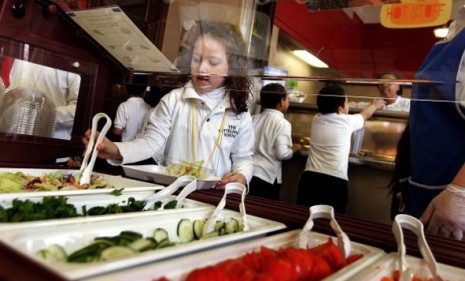A Chicago school's 'nanny state' ban on bagged lunches
In an effort to encourage healthier eating, one principal has prohibited students from bringing in homemade food. Is this anything but bureaucratic overreach?

A free daily email with the biggest news stories of the day – and the best features from TheWeek.com
You are now subscribed
Your newsletter sign-up was successful
America's school lunches aren't known for their nutritional benefits, but Elsa Carmona, the principal at Little Village Academy in Chicago, believes the alternative is far worse. Six years ago, she decided to ban homemade lunches after seeing students bring in unhealthy snacks and treats — a ban The Chicago Tribune recently revisited, prompting new debate. "It is better for the children to eat at the school," Carmona told The Tribune. "It's milk versus a Coke." Unsurprisingly, many students disagree and so do critics who say that parents, not schools, should be in charge of deciding what's best for their kids. Who's right?
This is a great idea for poor kids: "I have two words" for this policy, says Jenna Myers Karvunidis at ChicagoNow. "Right on." While school cafeteria lunches have their faults, they're often "the lesser of two evils." This is particularly true in low-income neighborhoods like the one Little Village Academy serves, where "there simply isn't room in the family budget for the luxury of nourishing, delicious food." If a public school's administration can provide a better alternative and "wants to better the community," then more power to them.
"A school ban on brown bag lunches? YES PLEASE"
The Week
Escape your echo chamber. Get the facts behind the news, plus analysis from multiple perspectives.

Sign up for The Week's Free Newsletters
From our morning news briefing to a weekly Good News Newsletter, get the best of The Week delivered directly to your inbox.
From our morning news briefing to a weekly Good News Newsletter, get the best of The Week delivered directly to your inbox.
Leave the state out of it: This misguided policy assumes that all parents are "incapable of making healthy food choices for their kids," according to HyperVocal, which is not true. But even if children were allowed to indulge in the occasional soda or sugary snack, it's not an administrator's place to interfere. Carmona's decision represents "the worst of the Nanny State."
Chicago school bans bagged lunches to encourage 'healthy eating'
School lunches need a complete overhaul: The problem isn't that Carmona banned homemade lunches, says Madeline Holler at Babble. The problem is "that's all she did." Instead of just forcing kids to eat boring meals, she should have taken the opportunity to "completely change her school’s meal culture." That means making the food actually taste good and giving students longer than 20 minutes to gobble down their food. Such measures would have defused a backlash, and made students more amenable to going without food from home.
"We need to improve all of school lunch, not just school food"
A free daily email with the biggest news stories of the day – and the best features from TheWeek.com
-
 Minnesota's legal system buckles under Trump's ICE surge
Minnesota's legal system buckles under Trump's ICE surgeIN THE SPOTLIGHT Mass arrests and chaotic administration have pushed Twin Cities courts to the brink as lawyers and judges alike struggle to keep pace with ICE’s activity
-
 Big-time money squabbles: the conflict over California’s proposed billionaire tax
Big-time money squabbles: the conflict over California’s proposed billionaire taxTalking Points Californians worth more than $1.1 billion would pay a one-time 5% tax
-
 ‘The West needs people’
‘The West needs people’Instant Opinion Opinion, comment and editorials of the day